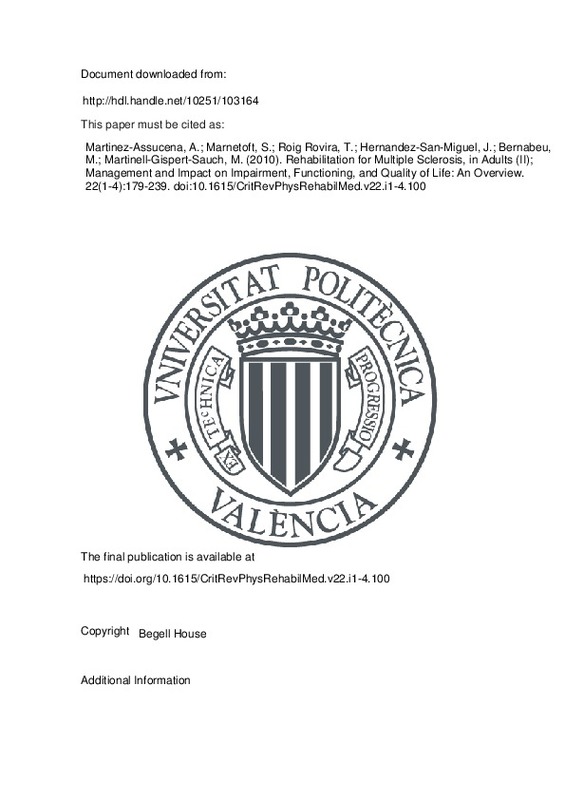JavaScript is disabled for your browser. Some features of this site may not work without it.
Buscar en RiuNet
Listar
Mi cuenta
Estadísticas
Ayuda RiuNet
Admin. UPV
Rehabilitation for Multiple Sclerosis, in Adults (II); Management and Impact on Impairment, Functioning, and Quality of Life: An Overview
Mostrar el registro sencillo del ítem
Ficheros en el ítem
| dc.contributor.author | Martinez-Assucena, Amparo
|
es_ES |
| dc.contributor.author | Marnetoft, Sven-Uno
|
es_ES |
| dc.contributor.author | Roig Rovira, Teresa
|
es_ES |
| dc.contributor.author | Hernandez-San-Miguel, Javier
|
es_ES |
| dc.contributor.author | Bernabeu, Montserrat
|
es_ES |
| dc.contributor.author | Martinell-Gispert-Sauch, Montserrat
|
es_ES |
| dc.date.accessioned | 2018-06-01T07:31:46Z | |
| dc.date.available | 2018-06-01T07:31:46Z | |
| dc.date.issued | 2010 | |
| dc.identifier.issn | 0896-2960 | |
| dc.identifier.uri | http://hdl.handle.net/10251/103164 | |
| dc.description.abstract | Multiple sclerosis (MS) often leads to different levels of severity and progression of impairment and disability and to dissimilar levels of limitation in activities and participation in different social domains, with varying impacts on quality of life (QoL) among people with MS (PwMS). Results have shown that, for PwMS, prioritizing goal setting may enhance adherence to treatment. Interdisciplinary rehabilitation may prolong the functional status level of PwMS, may result in transient improvement in the aspects of impairment features, may increase their participation in activities, and may improve their QoL, even when disease progression is not modified. Single rehabilitation packages of comprehensive care have proven beneficial, such as physiotherapy, which enhances aerobic capacity, strength, pain, mood, mobility, and QoL. Occupational therapy can help reduce the impact of impairment on QoL, especially fatigue. Neuropsychological interventions, such as learning and memory remediation, psychological intervention for depressive disorders, and acquistion of coping skills and self-management techniques help PwMS to adjust to disease and disability. Speech therapy can improve intelligibility of communication. Learning swallowing techniques can help prevent material from entering the airway. Clean intermittent self-catheterization can help prevent urinary tract infections. Power wheelchairs enhance occupational performance and energy conservation. Further vocational rehabilitation settings and research are required for more appropriate interventions due to high unemployment rates among PwMS. Comprehensive care for PwMS should include planning for future independent living and long-term care needs. | es_ES |
| dc.language | Inglés | es_ES |
| dc.publisher | Begell House | es_ES |
| dc.rights | Reserva de todos los derechos | es_ES |
| dc.subject | Multiple sclerosis | es_ES |
| dc.subject | Rehabilitation | es_ES |
| dc.subject | Physical therapy | es_ES |
| dc.subject | Occupational therapy | es_ES |
| dc.subject | Neuropsychology | es_ES |
| dc.subject | Speech therapy | es_ES |
| dc.title | Rehabilitation for Multiple Sclerosis, in Adults (II); Management and Impact on Impairment, Functioning, and Quality of Life: An Overview | es_ES |
| dc.type | Artículo | es_ES |
| dc.identifier.doi | 10.1615/CritRevPhysRehabilMed.v22.i1-4.100 | |
| dc.rights.accessRights | Abierto | es_ES |
| dc.contributor.affiliation | Universitat Politècnica de València. Biblioteca y Documentación Científica - Biblioteca i Documentació Científica | |
| dc.description.bibliographicCitation | Martinez-Assucena, A.; Marnetoft, S.; Roig Rovira, T.; Hernandez-San-Miguel, J.; Bernabeu, M.; Martinell-Gispert-Sauch, M. (2010). Rehabilitation for Multiple Sclerosis, in Adults (II); Management and Impact on Impairment, Functioning, and Quality of Life: An Overview. 22(1-4):179-239. doi:10.1615/CritRevPhysRehabilMed.v22.i1-4.100 | es_ES |
| dc.relation.publisherversion | https://doi.org/10.1615/CritRevPhysRehabilMed.v22.i1-4.100 | es_ES |
| dc.description.upvformatpinicio | 179 | es_ES |
| dc.description.upvformatpfin | 239 | es_ES |
| dc.description.volume | 22 | es_ES |
| dc.description.issue | 1-4 | es_ES |
| dc.identifier.eissn | 2162-6553 |







![[Cerrado]](/themes/UPV/images/candado.png)

